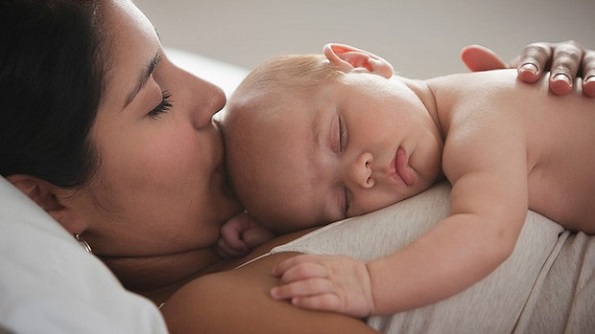
Babies vary in their sleep habits. Some babies have little trouble falling asleep while others may require baby sleep training to develop a regular routine. If you're a new mother, taking care of a baby of your own can be quite an adjustment, especially if your baby wakes up periodically during the night.
A baby's sleeping habits alone can turn your world upside down if you're not used to disruptions in your night time schedule.
Through this form of training, you can teach your baby good sleeping habits to ensure you both get all the rest you need. A good sleeping routine will help your baby be happier and healthier during this important stage in his life.
What is Baby Sleep Training?
Simply put, it is a means of teaching your baby how to sleep on a regular schedule. Your baby can learn to nap at regular times during the day and sleep all night long.
There are many advantages to your baby having a regular nap schedule during the day. It gives you time off to do household chores, spend time with other children, do a workout or take personal “me” time. Regular naptimes also prevent your baby from becoming overtired and getting sick due to lack of rest.
Newborns and young babies up to 4-5 months old will generally take morning and afternoon naps. As your baby grows older, he may stay awake all morning long and nap a little longer in the afternoon. Late afternoon naps could interfere with his night time schedule.
Some babies need little help falling asleep. After nursing or drinking their bottle, they just drift off into peaceful slumber, with little prodding or help. Other babies seem to have difficulty settling down, even after being fed. Once they've been awakened, they have a hard time falling asleep again.
It's not unusual for babies to need some help in falling asleep. By learning how to train your baby to fall asleep and wake up at certain times, new moms can do their part to ensure their little ones get the sleep they need.
When Can You Start Training Your Baby to Sleep?
For the first 3 months of your baby's life, he will be adjusting to his new environment and needs. More than likely, he will be sleeping only a few hours at a time and then waking to feed.
Most newborns feed every 2-3 hours round the clock, making it unrealistic to try to get him to sleep throughout the night at this early age. By seeing he's fed, changed, comforted and loved, your baby will be in a better mood to sleep.
By the time your baby turns 6 weeks or so, he will have had time to adjust to his new surroundings and life outside the womb. This is a good time to begin establishing a bedtime routine. Here are some ideas you may want to incorporate into your baby's bedtime schedule:
![]() Giving your baby a warm bath
Giving your baby a warm bath
![]() Changing him into bedtime sleeper or pajamas
Changing him into bedtime sleeper or pajamas
![]() Nursing or giving your baby a bottle
Nursing or giving your baby a bottle
![]() Reading a story, having cuddle time or singing songs to your baby
Reading a story, having cuddle time or singing songs to your baby
![]() Putting baby to bed with soft music
Putting baby to bed with soft music
As your baby grows older, you may want to incorporate other activities into his bedtime regimen such as tooth brushing, playing quiet games, etc.
Having a regular routine for bedtime helps babies to relax and become accustomed to the idea of going to sleep. Babies feel more secure when they have a regular pattern or routine to follow. After a while, your baby will become familiar with his routine and know what is expected of him, making it easier for him to settle down and fall asleep.
Baby bedtime routines are not only good for baby but for mommy and daddy as well. As a parent, you can use this time to help unwind from a busy day. It can be a special time that you share with your baby to help him feel loved, happy and secure.
Babies grow up awful fast – before you know it, the baby stage will be gone. I advise you to take advantage of this special time for bonding with your little one and setting the stage for his future growth.
By 3 months, your baby should have the makings of a regular sleeping/waking schedule to where he is sleeping less during the day and more at night. By the time your infant is around 4 months old, you can begin teaching your baby to sleep throughout the night. Some babies may already be sleeping through the night.
If your infant is still waking up periodically after 4 months old and doesn't have any medical problems that interfere with his sleep, sleep training may be just what he needs to develop better sleeping habits.
Baby Sleep Training Techniques
No two babies are exactly alike in their sleeping habits. A technique that may work well with one baby may not have the same results for another. Parents should choose a program they feel comfortable with and monitor its effectiveness in helping their baby sleep. You may need to try various techniques to see which works best for your little one, taking into consideration his physical and emotional needs.
Be Consistent
In studying a wide variety of infant sleep methods, researchers have concluded that the key to effective training is consistency. By being consistent in your method of training, you stand a better chance of getting positive results. The goal is to help your baby establish positive sleep patterns that will give him the rest he needs. At the same time, you will be able to obtain a good night's sleep.
Set the Environment
Make your baby's room conducive to sleep by dimming the lights and maintaining a warm and peaceful environment. If the room's too hot or too cold, baby may have a hard time getting to sleep. If there's a lot of activity going on, baby will not want to go to sleep. By setting the scene, you encourage baby to relax and go to sleep.
Establish a Routine
Routines help babies establish good sleep patterns. Your baby's sleep routine could be the key to getting him to sleep more peacefully and longer.
Some babies like being rocked to sleep; others enjoy hearing bedtime stories or soft music as they doze off. Swaddling your baby in a soft and warm blanket may make him feel safe and secure. A favorite stuffed toy could cue your baby that it's time to sleep.
Some babies go to sleep faster when mommy or daddy stay nearby where they can be seen.
Try different means of soothing your baby and getting him to relax and grow drowsy. Drowsy babies are more apt to fall asleep quicker than placing them in the crib when they're yet wide awake.
Allow Baby to Fuss and Soothe Himself to Sleep
If all else fails, you can simply let your infant fuss and cry himself to sleep. If you're a sensitive parent, this can be a difficult means of teaching your baby to sleep. However, it has proven to be effective.
Some pediatricians suggest letting your baby cry for short periods of time, then comforting him without taking him out of the crib. Others suggest comforting baby immediately, as soon as he begins to cry.
Either way, the idea is for baby to learn that once you put him in the crib, it's time for him to sleep. Although you are there to comfort him, you expect him to go to sleep.
After several nights of not being picked up and coddled, most babies get the point that bedtime is for sleeping. If your baby is still waking up for a night time feed, try to keep his feeding low key to encourage his going back to sleep easily afterwards.
Babies wake up at night for different reasons. They may be hungry, have a soiled diaper, feel sick or uncomfortable or simply want to be comforted. There's nothing wrong with checking on your little one to ensure he's okay. Once you take care of the problem, however, you should encourage your baby to go back to sleep until the morning.
Why Sleep Training?
Sleep training is a means of helping your baby develop good sleep habits from the start or break bad ones that have become a part of his life.
As a parent, there's no rule that says you must sleep train your child. If you are happy with your baby's sleeping habits and have no problem waking up once or twice at night to tend to your little one's needs, you have no need to train your baby to sleep at certain times.
If you're finding it difficult to keep up with your baby's tiresome sleep schedule, then training your baby to sleep at night may be the solution you need. Babies can learn to sleep more peacefully and longer from the time they are 3 or 4 months old.
Through baby sleep training, you can help cultivate good sleep habits in your children's lives that will benefit them well into their future.











 Facebook
Facebook Twitter
Twitter